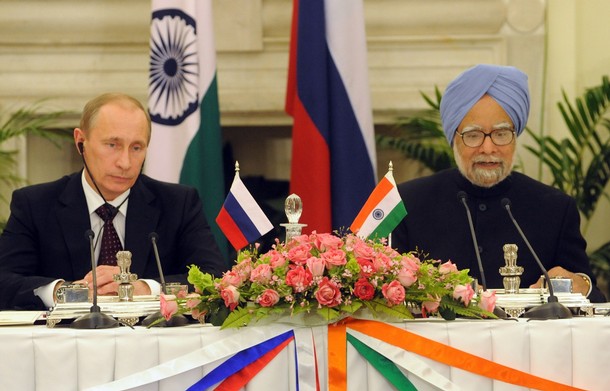
Washington and New Delhi last week announced the successful completion of a nuclear agreement granting India rights to reprocess nuclear fuel imported from the United States, moving the two countries one step closer to implementing a historic civilian nuclear deal that has become the centerpiece of the widely touted US-India “strategic partnership.” The accord provides a much needed boost to bilateral relations between the world’s oldest and largest democracies, which have shown some signs of strain amid concerns from officials in New Delhi that the Obama Administration was downgrading its relationship with India in order to ensure continued Pakistani support for Obama’s Af/Pak strategy.
The reprocessing pact is pursuant to the larger, landmark US-India civilian nuclear deal signed by the two countries in 2008 following three years of intense negotiations. Although India has refused to sign the Non-Proliferation Treaty (NPT), the deal effectively lifts a thirty-four year moratorium on nuclear commerce with New Delhi, originally imposed on India following its first round of nuclear tests in 1974. Without any domestic uranium reserves of its own, India must import uranium for its nuclear reactors which it will finally be able to do from the United States. Under the latest accord, India joins an elite club with just two other international parties that Washington currently permits to reprocess its spent nuclear fuel: Japan and a handful of European countries.
While the agreement allows India to finally import and reprocess spent nuclear fuel, the accord mandates that India establish a dedicated reprocessing facility for spent fuel under International Atomic Energy Agency (IAEA) safeguards. That reprocessing will be conducted under IAEA supervision and not directly by the United States highlights Washington’s sensitivity to India’s traditional concerns surrounding the sovereignty of its nuclear program.
The timing of the reprocessing pact is significant for several reasons. First, the announcement came almost immediately on the heels of the US-Pakistani “strategic dialogue” last week which aimed to shore up continued Pakistani support for the Obama Administration’s efforts to stabilize the faltering war in Afghanistan. The reprocessing agreement underlines the privileged and unique position India enjoys with Washington with regard to its nuclear program and stands in stark contrast to the cool response Islamabad received from American officials to its request for a nuclear deal akin to the one granted to India.
Second, the agreement was announced just weeks after New Delhi and Moscow reaffirmed their own strategic ties. The two former Cold War allies signed massive arms and nuclear deals worth billions of the dollars. The red-carpet welcome New Delhi rolled out for Russian Prime Minister Vladimir Putin was partially aimed at catching Washington’s attention and reminding the United States that India is ready to pursue robust partnerships with other powers if Washington’s attention is focused elsewhere.
Finally, Washington completed the reprocessing accord just two weeks before the Obama Administration is scheduled to host an international summit on nuclear security. The agreement serves to underscore Washington’s acceptance of India’s special nuclear status at a time when President Obama has made strengthening the nuclear non-proliferation regime a top priority of his administration and recently signed a historic nuclear-arms reduction agreement with Russia.
The nuclear deal will prove to be lucrative for American energy firms eager to capture their own share of India’s $150 billion nuclear energy market. As Timothy Roemer, U.S. Ambassador to India, pointed out in the statement announcing the agreement, "these arrangements will help open the door for U.S. firms in India’s rapidly expanding energy sector, creating thousands of jobs for the citizens of both our countries."
Although the reprocessing pact removes a key obstacle in the implementation of the US-India civilian nuclear deal, other hurdles remain. The United States is waiting for India to pass and enact legislation granting private American energy companies civil liability protection in case of a nuclear accident.
The accident-liability legislation has proven controversial in India. While the Indian cabinet has already approved the legislation, Prime Minister Manmohan Singh has been unable to introduce a bill in Parliament. India’s main opposition parties, which previously opposed the US-India civilian nuclear deal on the grounds that it unduly sacrificed India’s nuclear sovereignty to the United States, have vowed to block any liability legislation. American energy companies are hesitant to do business in India without legislation that guarantees their compensation liability in the event of a nuclear accident.
Final passage of the U.S.-India civilian nuclear deal also obligates New Delhi to submit a non-proliferation assurance to Washington stating that it will not transfer proprietary materials and technologies to third parties. The non-proliferation pledge constitutes a licensing requirement that governs all commercial nuclear exports.
The successful completion of the reprocessing agreement should serve to reassure officials in New Delhi who may have questioned President Obama’s commitment toward implementing the US-India nuclear deal. At a time when Washington’s intense focus on Afghanistan and Pakistan has prompted growing concern in New Delhi that the Obama Administration is “re-hyphenating” its foreign relations with India and Pakistan, the latest nuclear accord is a welcome – and much needed – development for US-India relations.
Ronak D. Desai is pursuing a joint law and public policy degree at Harvard Law School and Harvard’s John F. Kennedy School of Government. Photo credit: Getty Images.
Image: putin-singh.jpg
